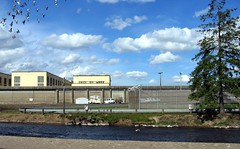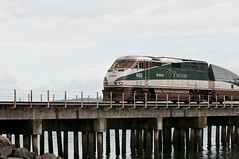That’s why standard political operating procedure is to move slowly, taking matters in small bites instead of big gulps. That’s why, from the very beginning, we seemed unlikely to take what I thought was the correct course for our health-care system: a single-payer model like the rest of the world. It was too much change for the country to digest. That’s undoubtedly part of the reason why almost nobody who ran for president supported it, and those who did went nowhere.
Instead, we’re fighting hard over a much less exalted set of reforms that represent a substantial shift, but not a tectonic one. You could -- and I do -- despise the insurance industry and Big Pharma for blocking progress, but they’re part of the game. Doubtless we should change the rules, so they represent a far less dominant part of it. But if that happens, it, too, will undoubtedly occur piece by piece, not all at once.
Moving by increments: it frustrates the hell out of many of us, and sometimes it’s truly disastrous. (I just watched Bill Moyers’ amazing recent broadcast of the LBJ tapes in the run-up to the full-scale escalation of the Vietnam War, where the president and his advisors just kept moving the numbers up a twitch at a time until we were neck deep in the Big Muddy.) Usually, however, incrementalism, whatever you think of it, lends a kind of stability to the conduct of our affairs -- often it has a way of setting the stage for the next move.
 We may have to wait years for the next round of health-care reform and, in the meantime, doubtless many people will suffer, but here’s the one thing we know: what we don’t do now doesn’t foreclose future progress. In fact, it may make it more likely -- if, after all, people grow comfortable with the idea of a “public option,” then the next time around the insurance industry won’t be able to make actual, honest-to-God public medicine seem so scary.
We may have to wait years for the next round of health-care reform and, in the meantime, doubtless many people will suffer, but here’s the one thing we know: what we don’t do now doesn’t foreclose future progress. In fact, it may make it more likely -- if, after all, people grow comfortable with the idea of a “public option,” then the next time around the insurance industry won’t be able to make actual, honest-to-God public medicine seem so scary.
Climate Change as Just Another Political Problem
When it comes to global warming, however, this is precisely why we’re headed off a cliff, why the Copenhagen talks that open this week, almost no matter what happens, will be a disaster. Because climate change is not like any other issue we’ve ever dealt with. Because the adversary here is not Republicans, or socialists, or deficits, or taxes, or misogyny, or racism, or any of the problems we normally face -- adversaries that can change over time, or be worn down, or disproved, or cast off. The adversary here is physics.
Physics has set an immutable bottom line on life as we know it on this planet. For two years now, we’ve been aware of just what that bottom line is: the NASA team headed by James Hansen gave it to us first. Any value for carbon dioxide (CO2) in the atmosphere greater than 350 parts per million is not compatible "with the planet on which civilization developed and to which life on earth is adapted.” That bottom line won’t change: above 350 and, sooner or later, the ice caps melt, sea levels rise, hydrological cycles are thrown off kilter, and so on.
And here’s the thing: physics doesn’t just impose a bottom line, it imposes a time limit. This is like no other challenge we face because every year we don’t deal with it, it gets much, much worse, and then, at a certain point, it becomes insoluble -- because, for instance, thawing permafrost in the Arctic releases so much methane into the atmosphere that we’re never able to get back into the safe zone. Even if, at that point, the U.S. Congress and the Chinese Communist Party’s Central Committee were to ban all cars and power plants, it would be too late.
Oh, and the current level of CO2 in the atmosphere is already at 390 parts per million, even as the amount of methane in the atmosphere has been spiking in the last two years. In other words, we’re over the edge already. We’re no longer capable of “preventing” global warming, only (maybe) preventing it on such a large scale that it takes down all our civilizations.
So here’s the thing: When Barack Obama goes to Copenhagen, he will treat global warming as another political problem, offering a promise of something like a 17% cut in our greenhouse gas emissions from their 2005 levels by 2020. This works out to a 4% cut from 1990 levels, the standard baseline for measurement, and yet scientists have calculated that the major industrialized nations need to cut their emissions by 40% to have any hope of getting us on a path back towards safety.
And even that 17% cut may turn out to be far too high a figure for the Senate. Here’s what Senator Jim Webb (a coal-country Democrat) wrote to the president last week: "I would like to express my concern regarding reports that the Administration may believe it has the unilateral power to commit the government of the United States to certain standards that may be agreed in Copenhagen… The phrase 'politically binding' has been used. As you well know from your time in the Senate, only specific legislation agreed upon in the Congress, or a treaty ratified by the Senate, could actually create such a commitment on behalf of our country."
In any case, the Senate has decided that it will not debate any climate-change bill until “the spring,” after health care is settled, and maybe entitlement reform, and perhaps even financial regulation. And awfully close to the next election.
Meanwhile, the Chinese are apparently prepared to offer a 40% reduction in the “energy intensity” of their economy by 2020. In other words, they claim they’ll then be using 40% less energy to make each yuan worth of stuff they ship off to WalMart. Which is better than not doing it, but more or less what the experts think would happen anyway as China’s economy naturally becomes more high-tech and efficient. It’s at best a minor stretch from “business as usual.”
Meanwhile, the Indians almost sacked their environment minister after the newspapers decided he was compromising the national interest by engaging in real negotiations about global warming.
Meanwhile, the Australian opposition last week did sack their leader for being willing to compromise on an already-compromised Emissions Trading Scheme that would have capped carbon -- meaning nothing will pass.
Meanwhile…
A Challenge Unique in History
A new analysis released Thursday by a consortium of European think-tanks shows that the various offers on the table add up to a world in which the atmosphere contains 650 parts per million and the temperature rises an ungodly five degrees Fahrenheit.
What I’m saying is: even the best politicians are treating the problem of climate change as a normal political one, where you halve the distance between various competing interests and do your best to reach some kind of consensus that doesn’t demand too much of anyone, yet reduces the political pressure for a few years -- at which time, of course, you (or possibly someone entirely different) will have to deal with it again.
Obama is doing the same thing with climate change that he did with health care. He’s acting with complete political realism, refusing to make the perfect the enemy of the good (or, really, the better-than-Bush). He’s doing what might make sense in almost any other situation.
Here, unfortunately, the foe is implacable. Implacable foes emerge rarely. The best human analog to the role physics is playing here may be fascism in the middle of the last century. There was no appeasing it, no making a normal political issue out of it. You had to decide to go all in, to transform the industrial base of the country to fight it, to put other things on hold, to demand sacrifice.
Yet it’s all too obvious that we’re not dealing with it that way. The president hasn’t, for instance, been on a nonstop campaign to make everyone realize the danger. When he went to China, he certainly reached some interesting agreements about cooperation on automobile technology, but that’s not the same as seeking a wartime partnership.
Nor is the senate meeting late into the night figuring out how to mobilize our country’s resources and people in the struggle to save our planet. Here’s how Missouri Senator Claire McCaskill summed up the mood: “I don’t think anyone’s excited about doing another really, really big thing that’s really, really hard that makes everybody mad.”
Some of us have been trying hard to open some political space for world leaders to step up to this challenge. We built a worldwide movement at 350.org that managed to pull off the “most widespread day of political action in the planet’s history” (at least according to CNN). In some places, it even sparked the desired result. Ninety-two nations, all poor and vulnerable to the early effects of climate change, have endorsed that radical 350 target.
Some of their leaders, like Mohamed Nasheed, the president of the Maldives, a nation made up of more than a thousand islands in the Indian Ocean, have emerged as tigers, ready to fight. No one would be surprised to see him lead some kind of walkout from the Copenhagen negotiations, since he’s declared over and over that he won’t be party to a “suicide pact” for his low-lying nation; he is, in other words, unwilling to treat global warming as a normal political issue.
We, however, couldn’t get even the most minor player in the Obama administration to come to one of the 2,000 rallies we staged across this country. None of them were interested in jumping into the space we were trying to open. If the U.S. is this willing to treat climate change as politics-as-usual, most of the other major players will simply follow suit.
They'll sign some kind of paper in Denmark -- that became all but certain on Friday night when Obama announced he'd jet in for the meeting's close. European leaders and some environmental groups may then call it a “qualified success,” and on we will go through more years of negotiation. In the meantime, physics will continue to operate, permafrost will continue to thaw, sea ice to melt, drought to spread.
It’s like nothing we’ve ever faced before -- and we’re facing it as if it’s just like everything else. That’s the problem.
Bill McKibben is a scholar in residence at Middlebury College. His The End of Nature, published in 1989, is regarded as the first book for a general audience on global warming. He is a founder of 350.org, a campaign to spread the goal of reducing atmospheric carbon dioxide to 350 parts per million worldwide. He is, most recently, the editor of American Earth: Environmental Writing Since Thoreau (Library of America). His next book will be Eaarth: Making a Life on a Tough New Planet, which will be published in April. To listen to a TomDispatch audio interview with McKibben on President Obama and climate change politics in the U.S., click here.
 The guiding image of Salem's transportation planning. Image by sameold2008 via Flickr
The guiding image of Salem's transportation planning. Image by sameold2008 via Flickr
![Reblog this post [with Zemanta]](http://img.zemanta.com/reblog_e.png?x-id=1294a0d1-2491-4b40-a3b7-4782d646da7b)


![Reblog this post [with Zemanta]](http://img.zemanta.com/reblog_e.png?x-id=fcf622b2-ef39-45e3-ad1e-ac2b4a8b19b6)

![Reblog this post [with Zemanta]](http://img.zemanta.com/reblog_e.png?x-id=fc5b7b52-1c6f-4bdd-b159-56de65a5be89)

![Reblog this post [with Zemanta]](http://img.zemanta.com/reblog_e.png?x-id=4e203c05-76ff-48f6-9820-9036fc0ad76c)







![Reblog this post [with Zemanta]](http://img.zemanta.com/reblog_e.png?x-id=f8106a39-f7bc-4150-af78-72ba357a6e8d)


![Reblog this post [with Zemanta]](http://img.zemanta.com/reblog_e.png?x-id=1555ce81-220e-4453-92cb-adba2093fc12)

![Reblog this post [with Zemanta]](http://img.zemanta.com/reblog_e.png?x-id=373834e5-c491-43b4-ba07-ada405aa5983)

![Reblog this post [with Zemanta]](http://img.zemanta.com/reblog_e.png?x-id=7050b10d-3316-4c00-8188-6d4be83cf9ee)

![Reblog this post [with Zemanta]](http://img.zemanta.com/reblog_e.png?x-id=2dad7bcc-a6c0-4da2-808d-deb2714b2d59)

![Reblog this post [with Zemanta]](http://img.zemanta.com/reblog_e.png?x-id=cc83662d-8241-44c7-bd12-ad211f9fb62a)

![Reblog this post [with Zemanta]](http://img.zemanta.com/reblog_e.png?x-id=cd90dda9-3f34-4b7f-957c-22220dc56984)


![Reblog this post [with Zemanta]](http://img.zemanta.com/reblog_e.png?x-id=26aca1f0-0be1-4f0b-a267-ba5f3fd69f29)

![Reblog this post [with Zemanta]](http://img.zemanta.com/reblog_e.png?x-id=6d5a400c-62f6-4b92-a523-e57caaa9746b)

![Reblog this post [with Zemanta]](http://img.zemanta.com/reblog_e.png?x-id=f845b522-c1aa-48b4-92c1-1d13cbcae510)

![Reblog this post [with Zemanta]](http://img.zemanta.com/reblog_e.png?x-id=b9d423ec-ae6b-4762-b34e-782d0affcea7)


![Reblog this post [with Zemanta]](http://img.zemanta.com/reblog_e.png?x-id=215c861d-b85e-468e-9655-cd9c55efa4bd)

![Reblog this post [with Zemanta]](http://img.zemanta.com/reblog_e.png?x-id=f6175a08-6915-4593-adfd-ead6867edada)



